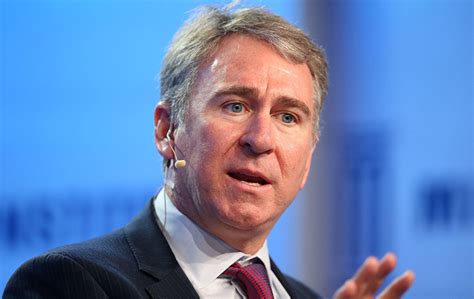
Billionaire Ken Griffin’s Citadel Advisors has significantly expanded its investment portfolio, adding stakes in several high-yield dividend stocks during the first quarter of 2024, signaling a strategic move towards income-generating assets.
Ken Griffin’s Citadel Advisors made notable moves in the first quarter of 2024, according to the latest 13F filings. The hedge fund increased its positions in several dividend-paying companies, reflecting a strategy aimed at capitalizing on stable income streams. Among the prominent additions are significant stakes in companies like Verizon Communications (VZ), AT&T (T), and Kinder Morgan (KMI), indicating a strong focus on telecommunications and energy infrastructure sectors known for their consistent dividend payouts. These investments suggest Griffin’s anticipation of sustained, reliable returns amidst potential market volatility.
Strategic Shift to Dividend Stocks
Citadel’s recent investment decisions reflect a broader trend among institutional investors towards dividend-paying stocks, which are often seen as safe havens during periods of economic uncertainty. These stocks provide a regular income stream, making them attractive to investors seeking to mitigate risk and generate steady returns. The telecommunications and energy sectors, in particular, are favored for their relatively stable cash flows and commitment to returning capital to shareholders through dividends.
“Dividend stocks can offer a cushion against market downturns,” notes a financial analyst at Goldman Sachs. “They provide a tangible return that can help offset potential losses from capital depreciation.” This sentiment underscores the growing appeal of dividend-focused investment strategies in the current market environment.
Key Investments Highlighted
-
Verizon Communications (VZ): Citadel initiated a new position in Verizon, acquiring a substantial number of shares. Verizon, a leading telecommunications company, is known for its robust dividend yield, making it an attractive investment for income-seeking investors. The company’s strong market position and consistent cash flow generation further enhance its appeal.
-
AT&T (T): Similar to Verizon, AT&T is another major player in the telecommunications industry that offers a compelling dividend yield. Citadel’s decision to increase its stake in AT&T reflects confidence in the company’s ability to maintain its dividend payouts and navigate the evolving telecommunications landscape.
-
Kinder Morgan (KMI): Investing in Kinder Morgan, a major North American energy infrastructure company, provides exposure to the energy sector while also benefiting from the company’s dividend payouts. Kinder Morgan’s extensive pipeline network and stable cash flows make it a reliable dividend stock.
Broader Portfolio Adjustments
In addition to these dividend stock investments, Citadel also made adjustments to other holdings in its portfolio. These adjustments reflect Griffin’s dynamic investment approach and his firm’s ability to adapt to changing market conditions. While specific details of all portfolio adjustments are extensive, the overarching theme is a move towards value and income-generating assets.
According to SEC filings, Citadel increased its holdings in several other companies while reducing positions in others. These moves are part of the firm’s ongoing efforts to optimize its portfolio and generate the best possible returns for its investors.
Market Context and Economic Outlook
Citadel’s strategic shift towards dividend stocks comes at a time of heightened economic uncertainty. Concerns about inflation, interest rates, and potential recession risks have prompted many investors to seek safer investment options. Dividend-paying stocks offer a degree of stability and income that can help investors weather market volatility.
“In an environment where interest rates are uncertain and economic growth is slowing, dividend stocks become particularly attractive,” says a portfolio manager at Fidelity Investments. “They provide a steady stream of income that can help offset potential capital losses.”
Impact on Citadel’s Performance
The impact of these investment decisions on Citadel’s overall performance remains to be seen. However, the firm’s track record of generating strong returns suggests that these moves are well-considered and aligned with its long-term investment objectives. Citadel is known for its sophisticated trading strategies and its ability to identify and capitalize on market opportunities.
The firm’s success is attributed to its team of experienced investment professionals, its advanced technology infrastructure, and its rigorous risk management practices. These factors enable Citadel to navigate complex market conditions and deliver consistent results for its clients.
Expert Analysis and Commentary
Financial analysts and market experts have offered various perspectives on Citadel’s recent investment decisions. Some believe that the move towards dividend stocks is a prudent strategy given the current economic climate. Others suggest that it may be a temporary shift in response to short-term market conditions.
“Citadel’s investment decisions are always closely watched by the market,” says an analyst at JP Morgan. “Their moves can often provide valuable insights into the firm’s outlook on the economy and the financial markets.”
Ken Griffin’s Investment Philosophy
Ken Griffin, the founder and CEO of Citadel, is known for his data-driven approach to investing and his willingness to embrace innovative technologies. He has built Citadel into one of the world’s largest and most successful hedge funds through a combination of rigorous analysis, disciplined risk management, and a commitment to excellence.
Griffin’s investment philosophy emphasizes the importance of understanding market dynamics, identifying undervalued assets, and managing risk effectively. He is a strong believer in the power of technology to enhance investment decision-making and improve portfolio performance.
Citadel’s Global Presence and Influence
Citadel has a global presence, with offices in major financial centers around the world. The firm’s influence extends beyond its investment activities, as it is also a major employer and a significant contributor to the global economy. Citadel is known for its commitment to innovation, its support for charitable causes, and its efforts to promote financial literacy.
The firm’s success has made Ken Griffin one of the most prominent figures in the financial industry. He is widely respected for his business acumen, his philanthropic efforts, and his contributions to the field of finance.
Future Outlook and Potential Developments
Looking ahead, it will be interesting to see how Citadel’s investment strategy evolves in response to changing market conditions. The firm is likely to continue to adapt its portfolio to reflect its outlook on the economy, interest rates, and other key factors.
Citadel is also expected to remain at the forefront of technological innovation in the financial industry. The firm is constantly investing in new technologies to improve its trading capabilities, enhance its risk management practices, and gain a competitive edge.
Detailed Breakdown of Individual Stock Transactions
To provide a more comprehensive understanding of Citadel’s investment activities, a detailed breakdown of specific stock transactions is essential. This includes not only the major additions like Verizon, AT&T, and Kinder Morgan but also significant increases or decreases in existing positions.
-
Increased Positions: Besides the headline-grabbing additions, Citadel also significantly increased its stakes in companies like Energy Transfer LP (ET). This midstream energy company is known for its high distribution yield and its critical role in transporting and processing natural gas and crude oil. The increased investment suggests Griffin’s confidence in the continued demand for energy infrastructure.
-
Decreased Positions: While expanding its dividend portfolio, Citadel also trimmed its holdings in certain growth stocks and sectors that may have become overvalued or faced increased risk. Although specific details vary, this rebalancing is a standard practice in portfolio management to optimize risk-adjusted returns.
Sector-Specific Analysis
Citadel’s focus on telecommunications and energy infrastructure is a notable trend. These sectors are often considered defensive, meaning they are less susceptible to economic downturns. This is because people still need to communicate and energy is still required, even during recessions.
-
Telecommunications: The telecommunications sector benefits from the essential nature of its services. In an increasingly connected world, reliable communication infrastructure is indispensable. Companies like Verizon and AT&T have established market positions and generate recurring revenue streams, making them attractive to investors seeking stability.
-
Energy Infrastructure: Energy infrastructure companies like Kinder Morgan play a critical role in the production and distribution of energy. These companies typically operate under long-term contracts, providing a predictable stream of revenue. As the demand for energy continues to grow, these companies are well-positioned to benefit.
Risk Factors and Considerations
While dividend stocks offer certain advantages, it is important to consider the potential risks associated with these investments.
-
Interest Rate Sensitivity: Dividend stocks can be sensitive to changes in interest rates. When interest rates rise, the relative attractiveness of dividend stocks may decline, as investors can earn higher yields from bonds and other fixed-income investments.
-
Dividend Cuts: Companies may reduce or eliminate their dividend payouts if they face financial difficulties. This can negatively impact the value of the stock and the income stream of investors.
-
Company-Specific Risks: Each company faces its own unique set of risks, including competitive pressures, regulatory changes, and technological disruptions. Investors need to carefully evaluate the risks associated with each stock before investing.
Comparative Analysis with Other Hedge Funds
It is helpful to compare Citadel’s investment decisions with those of other hedge funds to gain a broader perspective on market trends. While specific data may vary, analyzing the aggregate holdings of several large hedge funds can reveal common themes and investment strategies.
-
Common Trends: Many hedge funds have been increasing their exposure to dividend stocks and defensive sectors in recent months, reflecting a cautious outlook on the global economy.
-
Diverging Strategies: However, there are also notable differences in investment strategies among hedge funds. Some funds may be more focused on growth stocks or emerging markets, while others may prefer value stocks or alternative investments.
The Role of 13F Filings
The information about Citadel’s investment decisions is derived from 13F filings, which are required by the U.S. Securities and Exchange Commission (SEC). These filings provide a snapshot of the equity holdings of institutional investment managers with at least $100 million in assets under management.
-
Limitations: It is important to note that 13F filings have certain limitations. They are filed 45 days after the end of each quarter, so the information may be somewhat outdated. They also do not include information about short positions or other types of investments.
-
Insights: Despite these limitations, 13F filings provide valuable insights into the investment strategies of large institutional investors. They can be used to track portfolio changes, identify emerging trends, and gain a better understanding of market dynamics.
Conclusion: A Calculated Move for Stable Returns
Ken Griffin’s Citadel Advisors’ increased focus on dividend-paying stocks represents a strategic pivot towards stability and income generation in an uncertain economic environment. By bolstering its positions in established telecommunications and energy infrastructure companies, Citadel aims to capitalize on consistent dividend payouts and mitigate potential market volatility. This move underscores the growing appeal of dividend-focused investment strategies as investors seek reliable returns amidst economic headwinds. While the long-term impact remains to be seen, this calculated adjustment reflects Citadel’s commitment to adapting to market dynamics and delivering strong performance for its investors. The firm’s disciplined approach and strategic investments position it to navigate the complexities of the current market landscape and capitalize on opportunities for stable, long-term growth.
Frequently Asked Questions (FAQ)
1. Why is Ken Griffin’s Citadel Advisors increasing its investment in dividend stocks?
Citadel Advisors is increasing its investment in dividend stocks as a strategic move to generate stable income and mitigate risk amid economic uncertainty. Dividend stocks provide a regular income stream, making them attractive during periods of market volatility and concerns about inflation and interest rates. According to a financial analyst at Goldman Sachs, “Dividend stocks can offer a cushion against market downturns, [and] they provide a tangible return that can help offset potential losses from capital depreciation.”
2. Which specific companies did Citadel invest in during the first quarter of 2024?
During the first quarter of 2024, Citadel initiated or increased its positions in several dividend-paying companies, including Verizon Communications (VZ), AT&T (T), and Kinder Morgan (KMI). The firm also increased its holdings in Energy Transfer LP (ET). These companies are known for their robust dividend yields and stable cash flows.
3. What sectors are these investments primarily focused on?
These investments are primarily focused on the telecommunications and energy infrastructure sectors. These sectors are considered defensive, meaning they are less susceptible to economic downturns because their services are essential. Telecommunications companies like Verizon and AT&T provide indispensable communication infrastructure, while energy infrastructure companies like Kinder Morgan play a critical role in the production and distribution of energy.
4. What are the potential risks associated with investing in dividend stocks?
Potential risks associated with investing in dividend stocks include interest rate sensitivity, the possibility of dividend cuts, and company-specific risks. Dividend stocks can be sensitive to changes in interest rates; rising interest rates may decrease their relative attractiveness. Companies may reduce or eliminate their dividend payouts if they face financial difficulties, negatively impacting the stock’s value and investor income.
5. How do 13F filings provide insight into Citadel’s investment decisions?
13F filings, required by the SEC, provide a snapshot of the equity holdings of institutional investment managers like Citadel. These filings offer valuable insights into portfolio changes, emerging trends, and market dynamics. Although they have limitations (e.g., being filed 45 days after the quarter’s end and not including short positions), they enable investors to track the investment strategies of large institutions and gain a better understanding of their market outlook.









